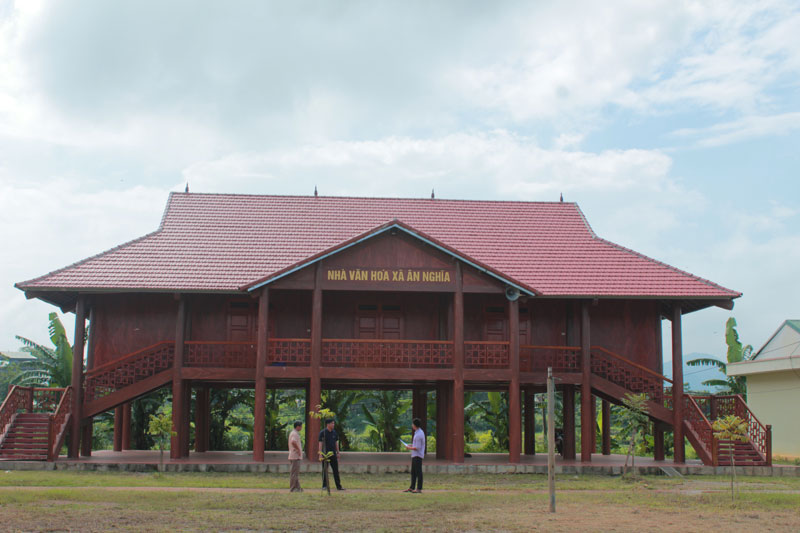
(HBO) – Hoa Binh province has carried out a slew of measures to help villages and communes build culture houses and appropriate cultural institutions so as to improve spiritual lives of local people. The move is part of the province’s effort to realise the national target programme on building new style rural areas.

The cultural house
in An Nghia commune, Lac Son district has been built based on local cultural
identity.
After
ten years implementing the new-style rural area building programme, the
province has been paid due attention to developing culture and sport
facilities. To date, cultural houses have been built in 1,443 out of 1,482
villages. By the end of this year, 97 out of 191 communes are expected to
fulfil the programme’s cultural facility criteria.
The campaign "All people stay united to build cultural life” has been
implemented in Hoa Binh city and all districts. By the end of 2018, the
province had 174,132 out of 212,506 households bestowed with "cultural family”
title, 1,392 out of 1,999 villages receiving "cultural village” title. This year, 184 out of 191 communes are
expected to achieve the programme’s culture criteria, increasing 115 communes
as compared to 2010.
According to Director of the provincial Department of Culture, Sports and
Tourism Bui Thi Niem, culture is an important factor in the new style rural
area building programme. The programme aims better local livelihoods, improve
transport infrastructure, build green and clean landscape, and preserve
traditional culture.
In the coming time, the local cultural sector will continue working to improve
quality of culture and cultural facility criteria, integrate the new-style
rural area building programme into the "All people stay united to build
cultural life” movement.
Investment will be made to build institutions, as well as sport and cultural
facilities, she said, adding the sector will work closely with the steering
board of the new-style rural area building programme to inspect and supervise
the implementation of culture criteria./.
Hoa Binh province is undergoing a dynamic transformation amid Vietnam’s national digital transition. Building on Poliburo’s Resolution No. 57-NQ/TW on breakthroughs in science, technology, innovation, and national digital transformation, the province has rolled out a wide range of practical action plans. A standout initiative is the "Digital Literacy for All” movement, an effort to ensure that no one is left behind in the digital era.
Hoa Binh province is undergoing a dynamic transformation in the wake of the national digital transformation movement. Building on Resolution No. 57-NQ/TW of the Politburo on breakthroughs in science, technology, innovation, and national digital transformation, the province has implemented a wide range of practical action plans. A standout initiative is the "Digital Literacy for All” movement ambitious effort to ensure that no one is left behind in the digital age.
With a spirit of unity and proactive problem-solving, the Party Committee, the government and the people of Dong Lai Commune (Tan Lac District) have made great strides in implementing the resolutions of the 24th Party Congress of the commune for the 2020 - 2025 term. Focusing on leadership and practical actions, the commune has brought the Party’s resolutions into daily life, creating strong impacts and pushing the local development forward.
Amid the nationwide push for digital transformation, young people in Hoa Binh Province are stepping up as dynamic pioneers, applying technology to enhance Youth Union operations and expand the reach of youth-led initiatives. Through creativity and adaptability, Youth Union organizations at all levels have introduced a series of practical solutions, contributing to modern governance and community development.
In recent years, An Nghia commune, located in Lac Son district, has stepped up administrative reform, focusing on improving the quality and efficiency of its single-window service unit for receiving and processing administrative procedures. These improvements have helped create favourable conditions for local residents and organisations to handle administrative procedures, contributing to the commune’s broader socio-economic development.
The Prime Minister-approved master plan to develop the multi-use value of forests ecosystems through 2030, with a vision to 2050, aims to improve the management and sustainable use of forest resources, create jobs, increase incomes, and improve the living standards of ethnic minorities, people in mountainous and remote areas, forest workers and those living near forests.



